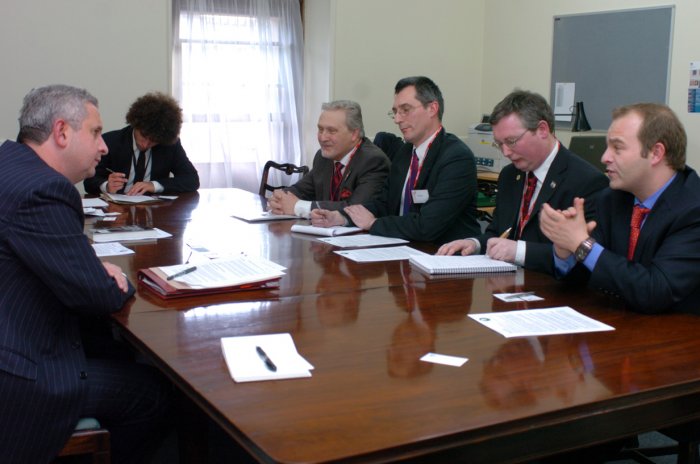The Mayors for Peace delegation in action at the Foreign Office
Earlier this week I sat in with a group from Mayors for Peace UK for a meeting at the Foreign and Commonwealth Office (FCO) with Ivan Lewis, the Minister responsible for Counter-Proliferation.
Mayors for Peace is a rapidly growing international movement of Mayors from around the world, currently representing the civic leaders from nearly 3,700 towns and cities from over 130 countries worldwide. There are now more than 60 Mayors for Peace in the UK, including Boris Johnson, Mayor of London, and the Mayors of Manchester, Glasgow, Birmingham, Edinburgh, Coventry, and many other major cities. The Mayors have been keen to meet Foreign Office ministers for for several months to talk about the forthcoming Non Proliferation Treaty Review Conference, and this week the meeting finally took place, organised with the help of Tony Lloyd, MP for Manchester Central – himself a former Foreign Office Minister and keen advocate of disarmament.
The Non Proliferation Treaty (NPT) is the key international treaty which controls the spread of nuclear weapons. The conference is reviewed every five years, and the next Review Conference, to be held in New York in May, is widely considered to be make or break for the future of the treaty.
The meeting gave an insight into the UK government's views ahead of the NPT Review Conference and although there were no surprises, it was useful to know what Ministers and their advisers are thinking at this stage. According to the FCO officials, Ministers have still to give their steer before the conference but most of the UK's positions are pretty clear by now. The Ministerial view, from Ivan Lewis, was that the UK hoped to be “realistic and ambitious” at the conference.
The main point of discussion was support for a Nuclear Weapons Convention – a binding international treaty which would eventually outlaw the possession and use of nuclear weapons. As we had expected, FCO stated that the conditions were not yet right for a Nuclear Weapons Convention, and their preferred way forward would be to use the NPT process to eliminate nuclear weapons rather than begin again on a separate track. Ratification of the Comprehensive Test Ban Treaty and work to develop a Fissile Materials Cut Off Treaty are seen by the government as the key building blocks for the present, with the view that a start down a separate track towards a Nuclear Weapons Convention is unlikely to make much headway.
Despite this, the Foreign Office team expressed strong support for the vision of a world without nuclear weapons, and there was recognition that a Nuclear Weapons Convention would provide the legal framework needed to get to zero. The Mayoral representatives made the point that the UK government could frame its views on a Nuclear Weapons Convention in a positive light in its opening statement to the conference, rather than not mention a convention or make a statement that might be interpreted as a move to block it, and this would probably been seen as constructive by others.
The FCO representatives said that their overall aim for the Review Conference was to reach a consensus agreement at the conference which balanced action against all three pillars of the NPT – nuclear disarmament, prevention of nuclear proliferation, and the sharing of nuclear technology for peaceful purposes – and laid out a clear plan which would take us forward on the route to disarmament. The Mayors proposed that the 'New International Consensus' outlined by the International Commission on Nuclear Non-Proliferation and Disarmament should be the basis for such a plan. The FCO team took the general view on the New International Consensus was that the UK was already doing most of what was proposed and had a good story to tell, but that the timetable and some of the deliverables might be problematic for the UK to accept. Of course, imposing a timetable for elimination of nuclear weapons will be essential if real progress is to be made towards reaching this goal, and the main obstacle to the goal in the past has been feet dragging and a lack of political will from the nuclear-weapon states.
Not surprisingly, FCO are also keen to see the government's current disarmament initiatives continued by whichever party forms the next administration, and are hoping that the Top Level Group formed recently by Des Browne and other senior parliamentarians will succeed in developing a cross-party consensus here.
The issue of public support was flagged up as important by Ivan Lewis, who said that public pressure is important in hardening political will, and that the role played by Mayors and NGOs in galvanising public opposition to nuclear weapons was essential. Twenty years ago nuclear disarmament was an issue confined to the political fringe, but now it has become mainstream, and the role played by Mayors for Peace has been “crucially important in championing the cause of nuclear disarmament”. Grass-roots pressure was critical in placing the Millenium Development Goals and the elimination of poverty on the political agenda, and the same kind of pressure is needed to make the goal of a world free of nuclear weapons possible.
The discussion also touched on the issue of the lawfulness of nuclear weapons, and whether the UK could say it would treat the use of nuclear weapons as a crime against humanity. The Minister conceded that this was unlikely to happen, but was at least willing to accept that the use of nuclear weapons must be governed by international law.
Intense discussion is taking place in the corridors of government around the world before the NPT review conference, and, with 189 of the world's governments and over 2000 non-government organisations taking part in the New York conference, the debate can only get hotter.
Visit the NIS Facebook site to watch video interviews with Ivan Lewis and members of the Mayors for Peace delegation to the Foreign Office.
